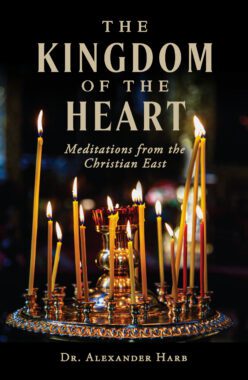A Reflection from “The Kindgom of the Heart” by Dr. Alexander Harb
Guarding Our Hearts
To be constantly on the lookout for sinful or distracting thoughts and impulses is called nepsis, or watchfulness. This concept is discussed by virtually all of the Eastern Fathers—most famously, perhaps, by St. John Climacus in The Ladder of Divine Ascent. It is also treated at length in the Philokalia. Hesychius the Priest says,
Watchfulness is a spiritual method which, if sedulously practiced over a long period, completely frees us with God’s help. . . . Watchfulness is a way embracing every virtue, every commandment. It is the heart’s stillness and . . . it is the guarding of the intellect. . . . Watchfulness is a continual fixing and halting of thought at the entrance of the heart.”
By being watchful of what enters our eyes and ears, and what arises in our minds, we can have much more peace because we won’t have any of the “junk” that complicates our lives and clouds our minds and hearts.
The Desert Fathers encourage their disciples to be on constant guard of their hearts because therein dwells the presence of the Holy Spirit. The prayer of the Spirit within our hearts crying, “Abba, Father,” unites us to God. Protecting our hearts from passions and temptations allows the Holy Spirit to remain peacefully within us, uniting us to our Father. Too often we give our hearts to whatever attractive persons or things come our way. We exhaust our energies on that which, ultimately, cannot fulfill us, but rather only drains us of our power.
Paul says, “Be watchful, stand firm in your faith, be courageous, be strong.” Everything that we do makes an impression on our hearts, and therefore to be watchful, we must recognize the things that threaten the light of God there. So too, we have to know how to defend our hearts. John of Damascus talks about eight spirits of evil that tend to disturb our hearts and lead us to sin. He says,
We should know that according to the Fathers there are eight kinds of thought that attack us. The first is gluttony; the second, lust; the third, avarice; the fourth, depression; the fifth, anger; the sixth, despair; the seventh, vain glory; the eighth, pride.
To guard the heart, Abba Antony would call out the name “Jesus” continuously; then he would say it silently in his heart. Abba Antony would tell his disciples, “The kingdom of Heaven is within you. . . . Thus living, let us keep guard carefully, and as it is written, ‘keep our hearts with all watchfulness.’ . . . [Therefore,] ‘Make straight your heart unto the Lord God of Israel’ . . . hold in your heart the commandments of Scripture; be mindful of the works of the saints.” Antony says himself that when the demons tried to distract him, “I continued praying with an unshaken heart.” Athanasius says that Antony would sit on the mountain in prayer with a watchful heart, and God would show him things from far away.
+
This article on anger and the cross is adapted from the book The Kindgom of the Heart by Dr. Alexander Harb which is available from Sophia Institute Press.
Art for this post on a reflection from The Kingdom of the Heart: cover used with permission; Photo used in accordance with Fair Use practices.





